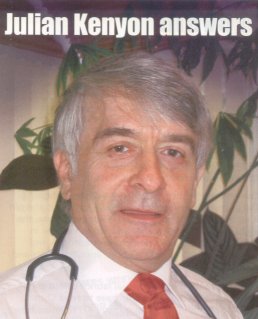Originally published in Issue 2 2005 icon

Dr Kenyon can also be reached directly, via www.doveclinic.com
Telephone: 020 7486 5588 or 01962 718 000
Q
I have just discovered your magazine website www.iconmag.co.uk, which seems very informative and balanced. I have a neighbour who has ovarian cancer, and has already had chemotherapy twice. This has helped somewhat, but has not completely cured it. She does not have the internet at home, which would be a help. What can I suggest to her, as she is looking for some alternative treatments but does not know where to start?
She could see a nutritional therapist (e.g. one trained at the Institute for Optimum Nutrition in London) for a start. A basic nutritional program would help to boost the immune system.
I have seen good information about Essiac tea, Graviola and Laetrile. There is also a new product called Astaxanthin, which can apparently be 500 times more powerful than vitamin E. (It is a carotenoid, and is the pink colour in flamingos and salmon.)
It is difficult to know if these things are safe to take in combination. Also she is new to nutritional therapy so is wary of taking large doses of anything, or of taking too many tablets or pills. Any advice about this, and/or ovarian cancer would be much valued.
A
Ovarian cancer is a real challenge as it is often discovered late simply because the ovaries lie at the back of the abdomen, and the tumour in that situation does not show itself until it is usually fairly extensive. Also, ovarian cancer is highly angiogenic, which means it easily forms new blood vessels to supply itself, but also it becomes widely disseminated. Therefore, the outlook is not good.
She would need to look into supporting her cell mediated immunity. She’d need to do something a lot more sophisticated than Essiac tea. Laetrile, doesn’t offer much hope in this situation. There are safer chemotherapies, which sometimes work in this situation, such as Ukrain (Chelidonium Majus and Thiotepa).
Using something to stop new blood vessels formation, socalled angiogenesis inhibitor would be helpful. There is an effective angiogenesis inhibitor called C-Statin which we have used for some years and we are able to reduce the levels of the marker for angiogenesis inhibitor, called Vascular Endothelial Growth Factor, in 80% of cases in whom we use this preparation. If she used a range of these approaches, then this would improve her outlook.
(Ed: there is a feature about Graviola on page 33)
Q
My husband has had colon cancer (6 years ago) and does not have a lot of control over his bowel. He is either constipated or loose whereby he takes codeine phosphate tablets given to him by his doctor. There is no happy medium and he spends most of his time in the toilet or the shower. The Hospital has now discovered he has diverticulitis where you need to have a high fibre diet. With the bowel cancer (or after the operation) he was told to go on a low fibre diet because of the fact that high fibre makes him go to the toilet a lot. There does not seem to be any answer for this problem and his standard of life at the moment is very poor, could you please advise if there is anything that you could recommend to make his life a little easier. A
You talk about a high fibre and low fibre diet and he has diverticulitis. A high fibre diet is definitely the best option in his case. However, he may also have food sensitivities, this is worth having a look at. From a treatment point of view the best approach in this case is to use traditional Chinese medicine, based on appropriate organ targeted remedies, that combined with looking at food sensitivities, would be his best hope. This needs a skilled doctor to handle this who is familiar with all of these approaches, because it’s not going to be easy to sort out.
Q
You might be able to help me - My friend was diagnosed with a tumor on the inside of the chest wall on the pleura. The Doctors suspect it was caused by asbestos inhalation in the fifties or sixties. They named it as mesothelioma and he is now being treated with Alimta and cisplatin. Is there anything that can be done for my friend? I would appreciate any help.A
Mesothelioma, which is a tumour which affects the covering of the lungs, known as the pleura, and is due to exposure to asbestos. It is uniformly fatal. Currently he is on chemotherapy. Chemotherapy however, is only helpful in a very small percentage of cases with patients with mesothelioma.
We use a combined approach, involving inhibition of new blood vessel formation to the tumour, known as angiogenesis inhibition. We use a tumour killing approach and we often do a specific cancer vaccine known as a dendritic cell vaccine. These particular vaccines are used almost routinely in mesothelioma in certain centres in Australia, where mesothelioma is common.
We have one patient who lived for six and a half years (his expected survival was six months at the time of diagnosis). We currently have another patient who has survived two and half years following diagnosis (again, he was given six months). This latter patient is alive and well, and is managing normal activity.
For more details on dendritic vaccines look on www.doveclinic.com then under Research/Resources and you will find a section there on Dendritic Vaccines. I hope this answer is helpful.